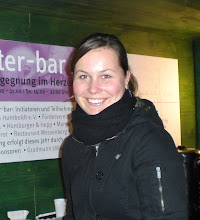Montag, 16. März 2009
At my school, many students walk around in the hall ways during class time, walk into the classroom and talk to other students, and therefore, disturb the lessons. My cooperating teacher and other teachers don’t mind that and for that reason, don’t do anything about it but it bothers me while I’m teaching. Do you think it would be appropriate for me as a student teacher to say something about it?
Exploring proportional reasoning through Harry Potter and the Sorcerer’s Stone:
I had to teach a unit about proportions. To start the unit I showed a part of the movie “Harry Potter and the Sorcerer’s Stone”. Specifically, the part where Harry meets Hagrid the first time. After watching the movie I started a discussion about Hagrid’s height, if he is really as tall and what they did to make him appear so tall. The discussion was followed by a worksheet for which the students had to measure daily objects like a fork and calculate the size versus Hagrid’s size. Finally, they had to solve two proportion problems based on their gained knowledge.
The students were engaged by using a movie all of them knew or at least heard about. Exploring proportional reasoning through the movie seemed to motivate the students since it was different from the “normal” math lessons and it made the content more relevant for the students because it was an example out of their daily life. The students understood the concepts of proportions really fast and were able to apply it to different problems. I got the impression that the students were proud of their results since they found the way to solve the problems nearly on their own. I was surprised how well the students responded to this way of introducing a new unit.
I had to teach a unit about proportions. To start the unit I showed a part of the movie “Harry Potter and the Sorcerer’s Stone”. Specifically, the part where Harry meets Hagrid the first time. After watching the movie I started a discussion about Hagrid’s height, if he is really as tall and what they did to make him appear so tall. The discussion was followed by a worksheet for which the students had to measure daily objects like a fork and calculate the size versus Hagrid’s size. Finally, they had to solve two proportion problems based on their gained knowledge.
The students were engaged by using a movie all of them knew or at least heard about. Exploring proportional reasoning through the movie seemed to motivate the students since it was different from the “normal” math lessons and it made the content more relevant for the students because it was an example out of their daily life. The students understood the concepts of proportions really fast and were able to apply it to different problems. I got the impression that the students were proud of their results since they found the way to solve the problems nearly on their own. I was surprised how well the students responded to this way of introducing a new unit.
Combine lecture and lab in one lesson or split it up?
My cooperating teacher doesn't combine lecture and labs in one lesson. He always lectures one day or more and then starts with labs after that. On one hand, the labs can be longer and more complex like that but on the other hand students have whole lessons just with lecture. Do you think this is a good way to teach or do you think a combination of lecture and lab in one lesson would be better?
Sonntag, 15. März 2009
I went to a project webfoot workshop at the university yesterday and it was really interesting. I got a lot of new ideas about activities I can do with my students. Even if it was a science workshop I can suggest that workshop to everybody. We got a lot of books with activities and other informations, so if you get the chance to participate in that workshop you should.
Abonnieren
Posts (Atom)
